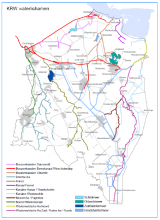Case study:Taarlosche Diep: Difference between revisions
Jump to navigation
Jump to search
Bas Wullems (talk | contribs) No edit summary |
Bas Wullems (talk | contribs) No edit summary |
||
| Line 16: | Line 16: | ||
|Multi-site=No | |Multi-site=No | ||
|Project picture=Waterlichamen Hunze en Aas.png | |Project picture=Waterlichamen Hunze en Aas.png | ||
|Picture description=WFD water bodies in the Hunze en Aa's water authority region. The Taarlosche Diep is part of the Drentse Aa water body. | |||
|Project summary=The Mowing regime in the Taarlose Diep was adapted to meet WFD goals and other ecological goals. A maintenance plan is currently being developed. | |Project summary=The Mowing regime in the Taarlose Diep was adapted to meet WFD goals and other ecological goals. A maintenance plan is currently being developed. | ||
|Monitoring surveys and results=Water levels, stream discharge, bed profile and ecological parameters are regularly monitored. | |Monitoring surveys and results=Water levels, stream discharge, bed profile and ecological parameters are regularly monitored. | ||
Revision as of 13:58, 19 January 2021
This case study is pending approval by a RiverWiki administrator.
Location: 53° 1' 49.15" N, 6° 38' 4.57" E
Left click to look around in the map, and use the wheel of your mouse to zoom in and out.
Project overview
| Status | Complete |
|---|---|
| Project web site | |
| Themes | Habitat and biodiversity, Hydromorphology, Monitoring, Water quality |
| Country | Netherlands |
| Main contact forename | Emiel |
| Main contact surname | Galetzka |
| Main contact user ID | |
| Contact organisation | Waterschap Hunze en Aa's |
| Contact organisation web site | http://hunzeenaas.nl |
| Partner organisations | |
| Parent multi-site project | |
| This is a parent project encompassing the following projects |
No |
Project summary
Edit project overview to modify the project summary.
The Mowing regime in the Taarlose Diep was adapted to meet WFD goals and other ecological goals. A maintenance plan is currently being developed.
Monitoring surveys and results
Edit project overview to modify the Monitoring survey and results.
Water levels, stream discharge, bed profile and ecological parameters are regularly monitored.
Lessons learnt
This case study hasn’t got any lessons learnt, you can add some by editing the project overview.
Image gallery
|
Catchment and subcatchment
Site
Project background
Cost for project phases
Reasons for river restoration
Measures
MonitoringHydromorphological quality elements
Biological quality elements
Physico-chemical quality elements
Any other monitoring, e.g. social, economic
Monitoring documents
Additional documents and videos
Additional links and references
Supplementary InformationEdit Supplementary Information
| ||||||||||||||||||||||||||||||||||||||||||||||||||||||||||||||||||||||||||||||||||||||||||||||||||||||||||||||||||||||||||||||||||||||||||||||||||||||||||||||||||||||||||||||||||

